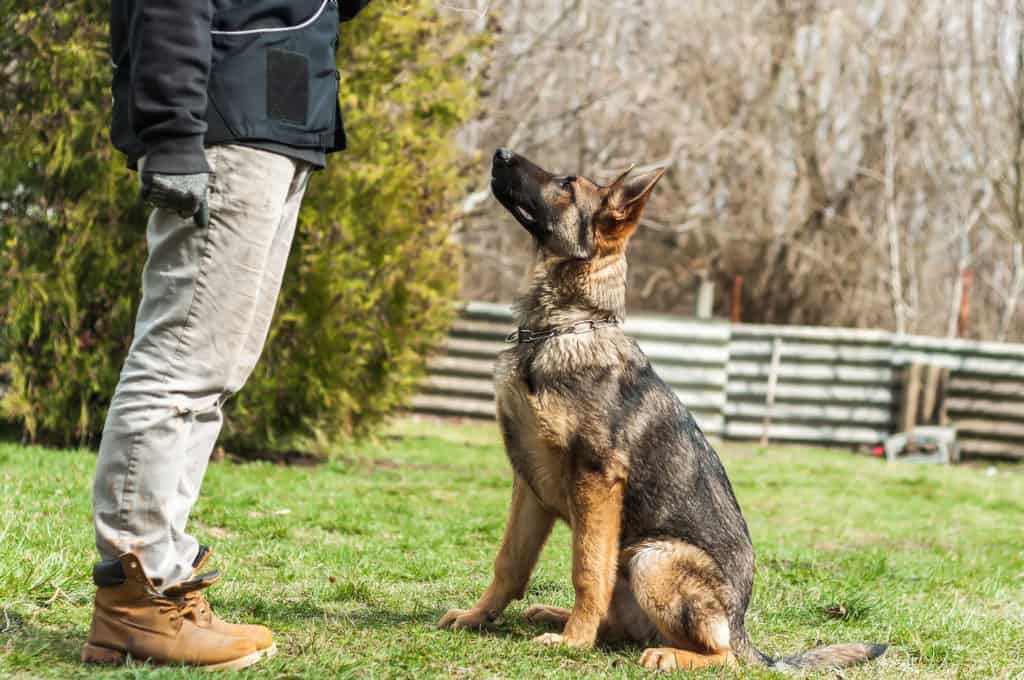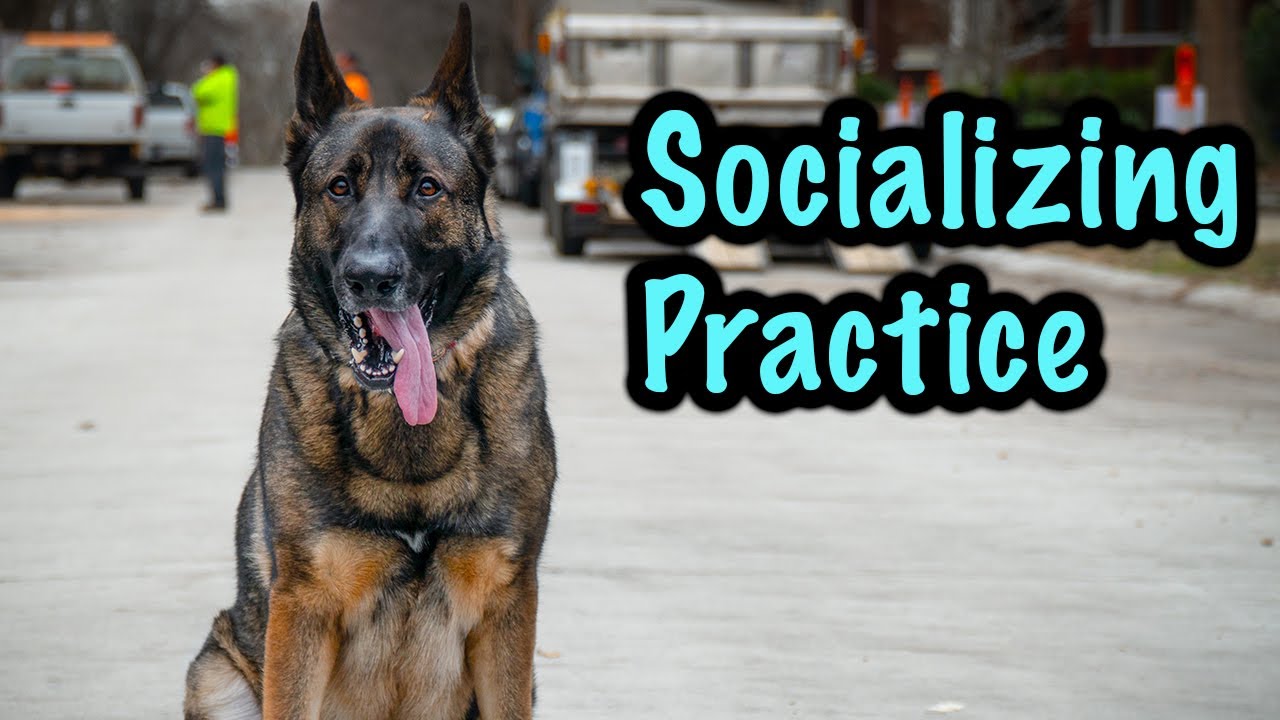When it comes to German Shepherds, you can see great potential in them that is hard to miss. Not only will they be loyal for a lifetime, but they can also be quite fun as long as they get a proper education. The German shepherd socialization process represents a very important part of their existence, both with humans and other animals.
Training to socialize will not be easy, much less if you do not have previous experience in this regard. Even so, many tricks could be used, which can work even in other races. You have to have patience and perseverance; that is the key to good training for your pet.
The Importance Of Socializing Your GSD Dog
Contents
- 1 The Importance Of Socializing Your GSD Dog
- 2 When Should You Start Socializing Your GSD?
- 3 What Do You Know Before Training GSD Socialization?
- 4 The Socialization Schedule
- 5 Introducing your GSD to other dogs
- 6 Introducing Your GSD To New People
- 7 Can Adult GSD Dogs Be Socialized?
- 8 Frequently Asked Questions
All dogs must learn to socialize regardless of their breeds, although, with German Shepherds, there is a greater need. They are more likely to become aggressive towards strangers when they are not controlled due to their naturally distant demeanor.
When intervening at an early age, raising a loving and friendly pet in varied environments is possible. It is also possible to use them as emotional support, although they must meet certain ESA requirements.
Having these types of documents is important, but they will be obtained to the certainty that the animal can function in different environments. Social skills must be adequately trained; only then will accreditation be obtained.
When Should You Start Socializing Your GSD?
There is a lot of speculation around this topic, but it is generally believed that between 2 and 12 weeks is ideal. You have to expose the dog to environments with many new people or situations to lay the groundwork with socialization.
Later it will be seen how the float deals with unknown circumstances more easily. If the puppy is obtained through a breeder, things change since you have to wait longer to pick it up.
When a breeder comes into play, it is essential to choose one responsible in every way. They should start this socialization process on their own so that they are prepared when they are adopted.
What Do You Know Before Training GSD Socialization?
A German Shepherd requires certain care that goes beyond training without feelings. Here are some things that should be considered:
-
No dog is the same
A German Shepherd’s general profile is a friendly, courageous, and confident pet, but all animals have certain differences. Knowing your flock is very important for training as they do not recognize some processes like others.
It is about adapting to the circumstances, and if something that worked before now does not, try something else.
-
Periods of fear
This can affect the animal, and there are chances that it will appear for the first time from 9 to 12 weeks. The second time can be from 6 to 12 months; these periods are important and cannot be ignored.
The Socialization Schedule

This schedule must be followed diligently to develop the German Shepherd’s ability to socialize properly.
0-3 weeks
They must be with the mother, but they can also interact with people; they must perceive smell.
3-6 weeks
The system should continue as before, only this time they should be exposed and used to more domestic noises. Also, puppies can be handled in preference; they must adapt to being cleaned and examined.
6-8 weeks
Puppies can be introduced to young children and allowed to play together with adult supervision. There is also the possibility of interacting with larger dogs, but these must be vaccinated and completely healthy.
8 weeks
This time is important since it is at this stage that the puppy is allowed to go to its permanent home. Here the canine can meet the whole family; even the neighbors should be introduced to the animal.
They should be exposed to common household noises, as well as vehicles and even fireworks. Allow them to meet babies, and they should also take them to play with quite a few people and even children.
9 weeks
Start implementing obedience strategies; these will be important for future social interventions. It is important that you also learn to be alone, but it is not good to hit it, set time intervals that gradually increase.

Introducing your GSD to other dogs
This can be overwhelming for some people, so it is appropriate to introduce the dogs in a neutral area. Doing this will prevent both animals from wanting to be territorial, a natural but inefficient behavior.
It is also important to investigate the other pet; it should be friendly and well trained. You should never immediately approach the dogs; leave them in the same area until they decide to approach.
Keeping both dogs on their leashes can avoid serious incidents; you must pay attention to the animal and its body language. If you see that either party is bullying the other, push your puppy away and try again later.
Introducing Your GSD To New People
As with dogs, introducing the German Shepherd to new people should be slow and careful. You should talk to people first and tell them to avoid any of these actions:
- Eye contact.
- Get up to speed.
- Zoom in on the face.
- Lean on your back.
It is necessary that they do not try to get too close and should observe it almost from the corner of their eye, that the dog is the one who starts everything. You mustn’t try to pet the animal immediately; you have to make them feel comfortable first.
Any behavior that denotes negativity, such as fear or anxiety, has to go back and not force the dog. The puppy does not need to be pampered either; it is enough to remove him from the situation and let him relax.
Can Adult GSD Dogs Be Socialized?
It may be a bit more complicated, but it is impossible to train an adult pet in socialization. With enough patience, it is possible to achieve a positive change in the canine, but there must also be a lot of dedication.
The first thing to do is teach him the correct signs: find him, leave him, aim and turn. All of them have a positive effect on the dog as they redirect its attention from other points.
Positive reinforcement is also quite important. The animal can be rewarded for super simple things. It is necessary that an exposure period is established and that this time is gradually increased.
You must be patient and investigate the limits of your dog. If you notice aggressiveness, it may go too fast, and you should back off. It is good to consider professionals’ help if you notice the German Shepherd too reluctant to learn.
Fear and aggression are very common in adult dogs that have not had the proper training, but they can be controlled. Perhaps an experienced coach can create great changes, but you must be aware that they are professional.
It’s a tough road, but it’s not impossible to get your adult German Shepherd to learn to socialize.
Frequently Asked Questions
Many methods you could start to socialize your old dog are: Take them for hikes. Taking the dog of yours for regular walks can help them a lot of things. And on your walks, they might see new surroundings, new animals, new people, and experience more other smells.
Even in case you choose to follow an untrained GSD or perhaps you’ve never properly trained your very own puppy, it’s never too late! And then keep training sessions brief and structured. There are several good things about educating an old German Shepherd. Older dogs can continue to be socialized. Nonetheless, take it slowly in the beginning.
Do German shepherds get on along with other dogs?
GSDs are loyal and intelligent. If they’re raised along with other dogs, they’re prone to get together with them. And, in case they’re socialized properly from age, they’ll generally be great along with other dogs. Nevertheless, studies propose that German Shepherds are more aggressive than many other breed dogs.
Could you still train a one-year-old GSD dog?
Simple commands are adequate for teaching him how you can be a good, well-mannered, brilliant German Shepherd. He can find out advanced obedience commands after he’s six months or even one year old. The advanced commands may help trick education, agility, or perhaps working situations with commands like Jump, Fetch, or perhaps Speak.




